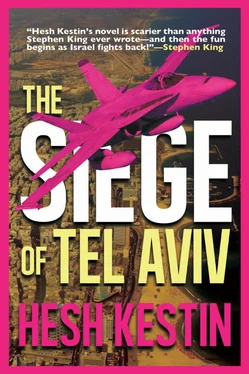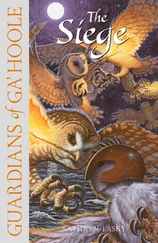“Be seated,” Pinky says. “We’ll make this quick. I’m informed by Col. Lior that you’ve been well briefed, both those of you in the insertion team and the pilots. If you have questions, ask now.”
The uniformed men and a few women, among them Alex, are silent.
Pinky expects nothing less. “In one hour, the paint on the buses will be dry. Let’s hope we can say the same for your pants.”
He salutes, cutting short their laughter.
“Good luck, and safe home.”
The assembled force rises as one to return the salute. The chief of staff leaves as abruptly as he entered.
Col. Lior takes over. For a man of his imposing physical presence—he began his military career as an instructor in krav maga , the IDF’s contribution to hand-to-hand fighting—he speaks softly, the assembled soldiers leaning forward to pick up his words.
“It is precisely four hours. In thirty minutes, you will be appropriately suited up. From this point until the conclusion of stage one of Operation Davidka—the successful conclusion—the language of ops is Arabic. Those of you who speak no Arabic will be mute under any and all circumstances. I expect the Arabic speakers among us to think in Arabic, be anxious in Arabic, if necessary kill in Arabic. As has been pointed out, upon the success of this operation depends the entire future of the State of Israel. Now be good Arabs and get dressed for the party. Dismissed.”
AT THEIR BASE JUST south of Jerusalem, 1194 tanks of the Royal Jordanian Armored Corps are lined up like a child’s toy army, but one with the greatest destructive potential of any armored force in the Middle East: 400 upgraded British Challenger I tanks, 250 updated British Chieftains, the remainder modernized US M60s. As their commander’s olive-green Rolls Royce Silver Shadow Landaulette begins slowly to roll past, each tank commander starts his engine, so that what begins as a single roar gathers cumulative force until the noise is so great it is as if the roar of engines is all, the massive 1500 and 1200 cc motors creating their own universe of percussive sound. But as the command vehicle rolls by to take the salute of the tank crews arrayed precisely in V formation in front of their tanks, not one tankist is ignorant of the fact that it is not Ticky Pasha standing in the open back of the Rolls but his second in command. The superstitious Bedouin tank crews know that Ticky Pasha has never not been there to take their salute before an attack. In the dark cloud rising from the smoke of burning diesel, many wonder what this portends.
FROM THE TERRACE OF a second-floor apartment, Cobi peers up and down Ibn-Gvirol Street, the would-be Park Avenue of Tel Aviv were it not for the design of the apartment houses that line its six lanes. As in the Italian city of Bologna, its apartments are cantilevered over the sidewalk, so that pedestrians shopping at street level or drinking espresso outside the cafés are shaded from the Middle Eastern sun and protected from the long winter days of rain. Now there is neither shopping nor coffee drinking, but there is shade, beneath which tens of thousands of Jews sit on the cracked pavement and do what refugees do. Nothing.
Apart from the pistol strapped to his waist, Cobi is armed only with a foot-long brass pipe, once a spent artillery shell, sealed at both ends. A ball-peen hammer is tucked into his military web-belt.
As expected, the first of a long line of Royal Jordanian tanks appears from the south, making its way slowly down the divided boulevard. Not one shot is fired from their cannons. Apparently their intent is to take up positions along its entire length so as to seal the long roadway from end to end.
Cobi tests the cable strung tight across the boulevard.
Like the other cables, it is taut as the string of a violin, the white sheet pinned to it announcing surrender—a surrender that everyone in the city understands will not be honored by the victors. Their tanks are not here in some imperial gesture or show of strength. They are not here to proclaim victory, but to execute it. Tel Aviv is about to be blasted to bits.
As the endless column moves down the boulevard—named for the medieval Spanish poet who wrote in both Arabic and Hebrew, a detail which could not possibly interest the invading force—the lead tank’s commander scans the street through binoculars. Sure of the city’s surrender, he stands in his turret. He sees nothing but white sheets. Satisfied, he re-enters his Challenger, seals the hatch, and orders his driver to continue until the very end of the street, which his digital map shows terminating at a rather flimsy bridge over the Yarkon River. After the buildings on either side are destroyed and their inhabitants annihilated like cockroaches, he will order his brigade to bypass the flimsy bridge, cross the river, little more than a wet ditch at this time of year, and then attack the northern suburbs, whose highrise apartment buildings can be expected to collapse. After that, they must only wait for Egyptian infantry to pour into the open wound that was Israel’s first city and mop up the surviving population.
AS THE SUN RISES over Highway 2, which links Tel Aviv to the international airport and then continues east to Jerusalem, the commander of a division of Egyptian mechanized infantry, some ten thousand men in two hundred vehicles, spots an Egyptian Humvee and several truckloads of personnel coming straight at him.
The commander opens communication. “Eastbound force, identify. This is Eagle Green. Identify.”
“Eagle Green, Eagle Green, this is Reconnaissance Group Gamal, this is Reconnaissance Group Gamal.”
“Gamal, I know no such formation. Over.”
Laughter erupts from his headset. “Nor were you to know. Eagle Green, we are an independent unit, very hush-hush, attached to Field Intelligence HQ. We expected to be out of your line of fire an hour ago, but ran into small Jewish resistance. Over.”
“Gamal, Jewish resistance? I am informed the entire city has surrendered. Please amplify, over.”
“Eagle Green, this appears to have been a dissident group. You know our cousins: two Jews, three opinions. Small arms. Nineteen men. I personally counted the bodies. Neutralized. Repeat, neutralized. Over.”
“The city is wide open, then? Over.”
“Like a beautiful woman on the cold steel table of a gynecologist,” the voice on the phone comes back. “We are returning now to Field Intel HQ, adjacent Arafat International Airport. Please stand by for signal to proceed west. Over.”
“Copy that, Gamal. Over.”
“Eagle Green, Force Gamal now moving out of your trajectory. Happy hunting! Over.”
The Egyptian commander watches through his binoculars as the reconnaissance unit pulls onto an exit ramp marked with the sign of an airplane. The Hebrew and English for Ben Gurion International Airport have been painted over, but no one has relettered Yasser Arafat over it in Arabic and English. “Allah willing, Gamal. See you in former Tel Aviv. Over.”
The reconnaissance unit has moved beneath the road to an underpass and is temporarily out of sight.
“Eagle Green, Eagle Green. Don’t kill all the Jews, my brother. Leave some for us. Over.”
“Not to worry, Gamal. We have before us many days of hard work. Your assistance will be welcomed. Thousands of blond Jewesses await. Over and out.”
LIKE ALL THE MAJOR roads in conquered Israel, Highway 2 is controlled and administered by Iran. This came about because it was quickly seen that only an outside authority could be trusted to maintain the roadways snaking in and out of territories administered by four other nations. But Iran has little interest in maintaining the highways of a country split into four sectors, none of which is Iranian. This is why the highway sign leading to Yasser Arafat International Airport is blank.
Читать дальше












